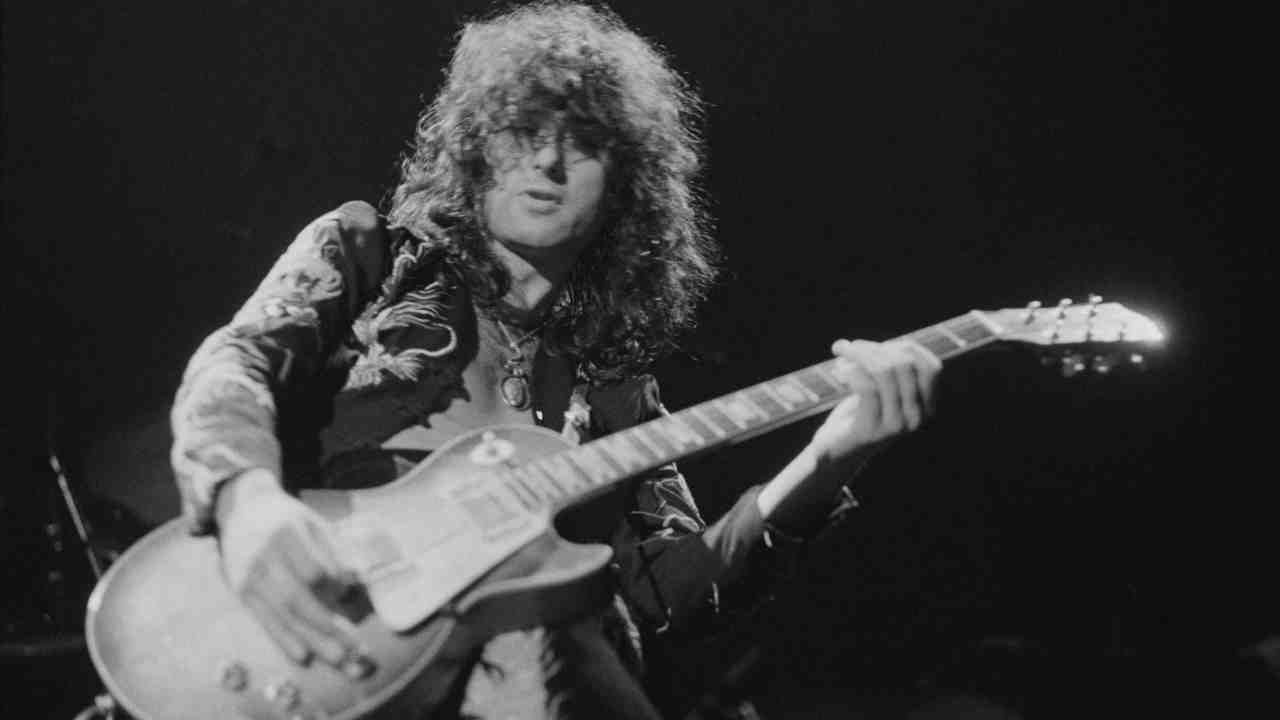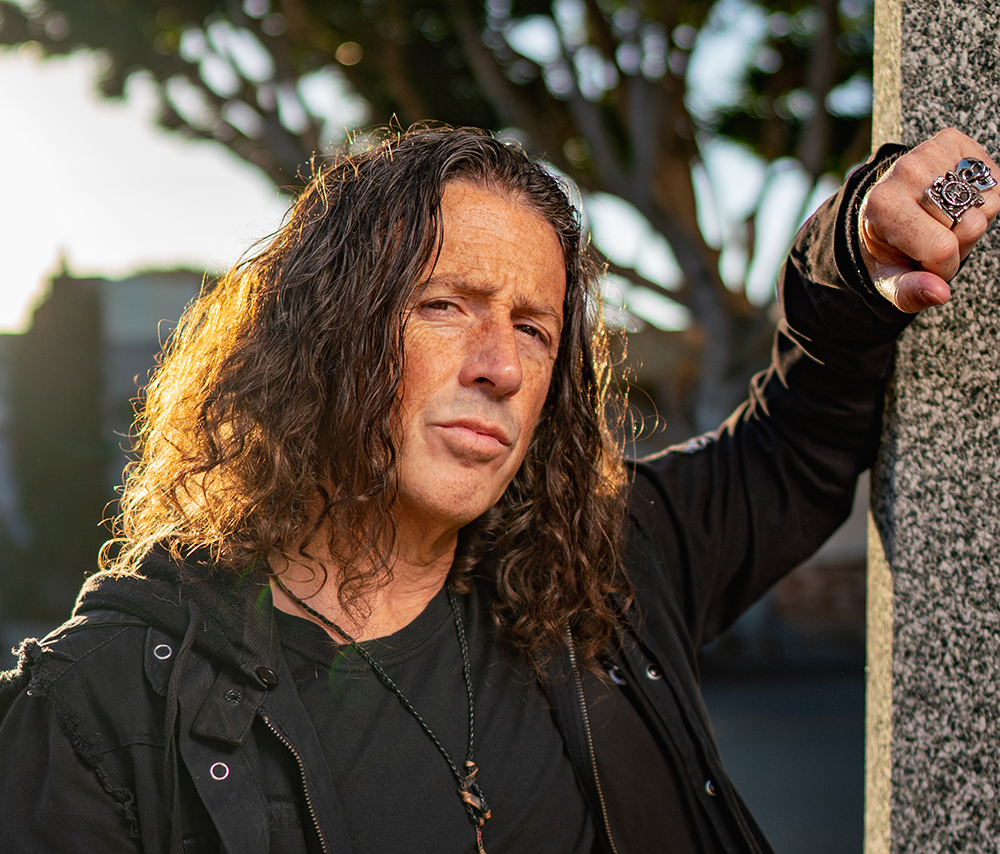With the dawn of 2024 looms a significant milestone — Led Zeppelin’s visionary guitarist Jimmy Page turns 80 on January 9. Volumes have chronicled how Page both refined and reframed the role of electric guitar in modern rock. Making his bones as a shit hot session man in the 60s, Page joined The Yardbirds, emerging as a bona fide star in his own right, but it was his formation of Led Zeppelin that galvanised Page’s legend as the preeminent rock guitarist of his generation. With a catalogue dominated by some of the greatest riffs in rock history, here are his ten best:

10. Over The Hills And Far Away (Houses Of The Holy, 1973)
This evocative composition from Houses Of The Holy balances baroque acoustic introspection with simmering electric intensity. Page demonstrates his mastery over both realms, crafting two riffs that ache with wanderlust and longing. The jangly acoustic riff in the intro sets a reflective tone which then transitions into a heavier, electrified section, showcasing Page’s broad dynamic range. This riff is a narrative in itself, a sonic exploration of different textures and emotions and a shining example of Page's skill in creating music that evokes precise, stirring emotion.
9. Rock And Roll (Led Zeppelin IV, 1971)
During a break in the sessions for Led Zeppelin IV, John Bonham launched into a storming, Little Richard-inspired tempo and Page eagerly dove in with a souped-up, twelve-bar blues riff that catapulted the rock sound of the 50s straight into ground zero of the hard rock revolution. Simple, unadorned and stupidly-catchy, the riff stands as a dashboard-slapping testament to Page’s effortless ability to pay homage to the past while driving rock and roll forward at breakneck speed, proclaiming to a gobsmacked world, “Let go or be dragged.”
8. Good Times Bad Times (Led Zeppelin I, 1969)
This iconic riff from Zeppelin’s debut album is a marvel of technical precision and rhythmic sophistication. Page fuses tight, crisp guitar work with a pulsating groove, showcasing his ability to blend intricate musicianship with raw rock energy. The use of syncopation and studio effects illustrates his innovative outlook and tonal exploration. A masterclass in controlled chaos, Page fuses elite technicality with soul-shaking groove. It’s a powerful opening statement for Led Zeppelin, setting the stage for a full-blown revolution in the world of rock music.
7. Immigrant Song (Led Zeppelin III, 1970)
Page’s fretwork here is a relentless sonic assault that channels the bellicose spirit of Viking warriors. It’s a study in efficiency, with Page generating a surging, primal force with a simple riff that inexorably repeats throughout the first thirty seconds of the track. The effect is both mesmerising and barbaric. This riff is the embodiment of Led Zeppelin’s ferocious, bullshit-free approach to heaviness, an unambiguous and fearsome declaration that Zeppelin were far more than a pack of flaxen-haired blues worshippers.
6. The Ocean (Houses Of The Holy, 1973)
The Ocean is a full-throttle rhythmic joyride that underscores a point too often ignored — that Zeppelin were the funkiest hard rock band of the 70s. This riff is playful, groovy and brimming with a sleazy abandon that compels the shaking of hips. It demonstrates both Page's versatility and his ability to seamlessly blend genres. The Ocean is an upbeat, spirited track that highlights Page's proficiency in crafting riffs with a distinct narrative quality — they are not just heard but felt.
5. Stairway To Heaven (Led Zeppelin IV, 1971)
The opening melody gets all the attention but within Stairway To Heaven is an innovative progression of riffs, spanning celestial realms to brute, earth-shaking force. When the song transitions from the folksy introspection of the first part, Page layers in a breezy flurry of reverb-drenched, open chords that lead into his smouldering solo. As the solo winds into its skyscraping crescendo, Page uncorks a fresh siege of chugging, distorted riffs, raging beneath Plant’s otherworldly howls. One of rocks’ greatest moments.
4. Kashmir (Physical Graffiti, 1975)
The signature track on the masterpiece that is Physical Graffiti is an exotic sonic odyssey that taps into consciousness-elevating vibrations. Page crafts a riff that is as grandiose as it is hypnotic, fusing Eastern mysticism with rock’s visceral punch. The use of alternate tuning creates a rich, orchestral texture, evoking vivid images of vast, uncharted landscapes. Showcasing Page's visionary outlook, it blends diverse influences into a mesmerising cerebral experience. Page told The Guardian in 2015 that Kashmir was the ultimate album closer, stating, “That’s it. Nothing follows that. You need time to catch your breath after.”
3. Heartbreaker (Led Zeppelin II, 1969)
Heartbreaker is an unyielding force, delivering a riff that strikes with the intensity of a lightning bolt. Page weaves through scales with a frenzied urgency, turning his guitar into a six-stringed flamethrower. Though the jaw-dropping 45-second solo is a focal point, the intro’s iconic riff is the embodiment of rock in its most undiluted form - aggressive, unapologetic and exhilarating. The Internet aches from the weight of endless YouTube guitar tutorials for this song and not a single one sounds like Jimmy.
2. Black Dog (Led Zeppelin IV, 1971)
A masterful display of rhythmic complexity and melodic innovation. This riff dances erratically, like a shadow in a strobe-lit room, seeming to sidestep conventional time signatures with ragged defiance. However, it’s an auditory illusion; the drum groove actually doesn’t break, the riff begins half a beat later on every repetition, emphasising the same notes. This means that Page essentially plays in 4.5/4 tempo while Bonzo is playing in 4/4. Dizzying, heavy and thrilling, Black Dog easily sits among the most memorable opening tracks in history.
1. Whole Lotta Love (Led Zeppelin II, 1969)
Whole Lotta Love is a sonic juggernaut, embodying the essence of heavy rock with raw, unstoppable force. Page transforms blues into an electrifying cosmic voyage, bringing down a psychedelic sledgehammer that smashed straight through 60s rock conventions. The riff’s simplicity belies its sheer power; this is blues supercharged for a new era, a relentless force that erupted across the musical landscape. This riff heralded a seismic shift in rock music, echoing through time as a testament to Page's skill, vision and utterly ferocious spirit.

